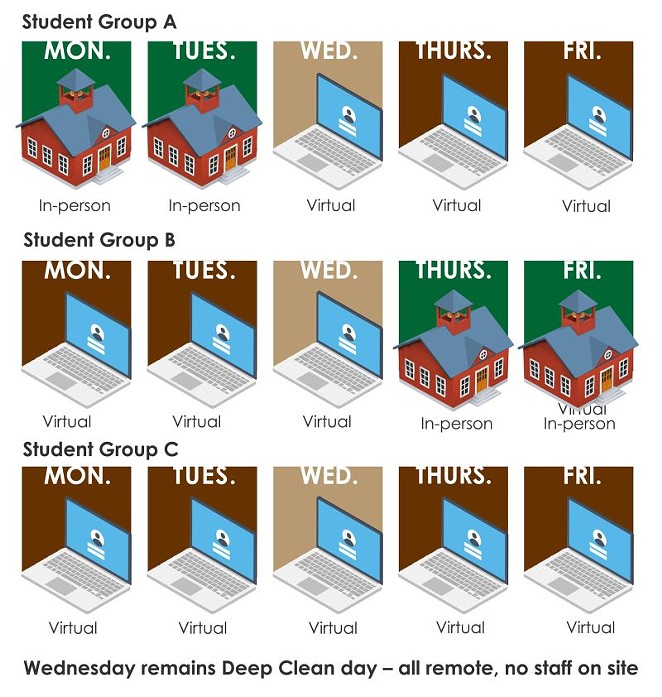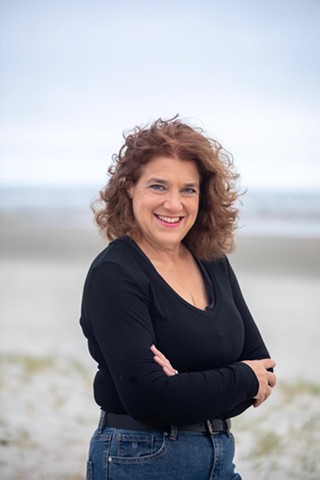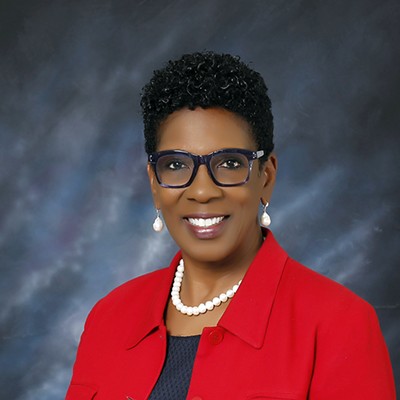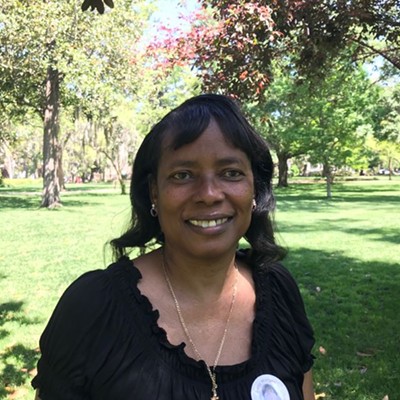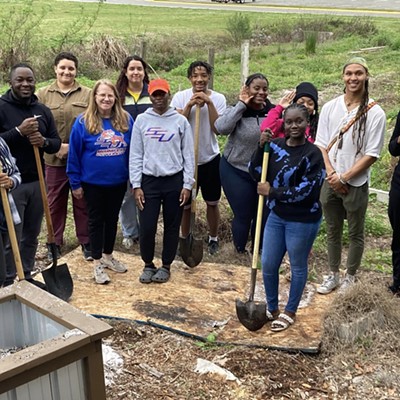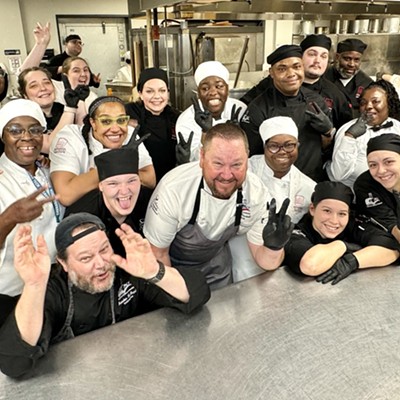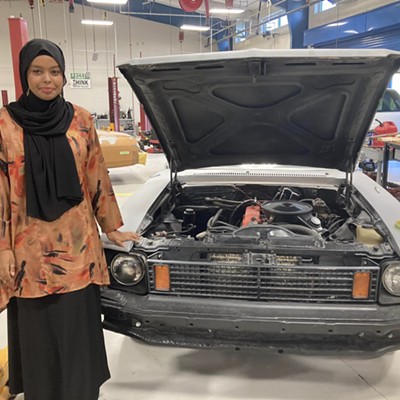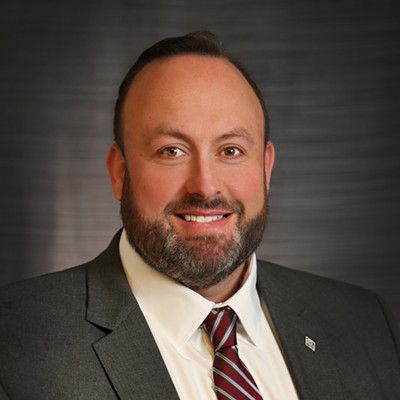BACK TO school looked different this year for Savannah-Chatham County Public Schools teachers and students, as all returned virtually due to coronavirus.
With COVID cases and deaths continuing to increase, in July the School Board voted unanimously to the virtual start.
Even though the Community Transition Index remains in the red zone, last Wednesday, after administration presented plans to begin a phased plan to open buildings at 42 schools, the Savannah-Chatham County School Board passed a resolution that in part says:
“Board of Education does hereby acknowledge and approve the actions taken by the Superintendent and administrators in preparation for the phased hybrid return of students to school and the re-opening of school buildings for the purpose of providing educational services.”
The School Board also authorized Superintendent Ann Levett to modify the plan if there is a decline in public health conditions which would put students and staff at greater risk due to coronavirus.
The Board made it clear that no teacher would be forced to do in-person teaching, and the phased-in approach would be subject to constraints of time, building capacity, staffing, and public health.
The phased plan outlines tentative dates and phases of reopening the buildings for parents who choose the in-person hybrid.
The first tentative return date is Oct. 5 for the least independent learners, grades pre-K to 2nd, and transitional grades 6th and 9th.
The next phase of the plan has a tentative return date of Oct. 26, and includes all other grades not covered in phase two.
Students who enter the in-person learning will attend two days per week, and continue with virtual learning the other three days of the week. At this time, bussing will not be provided.
Virtual learning will continue to be an option for all students until the end of the school year, and those students will be taught by the teachers who elect to continue virtually.
The Board was resoundingly clear that no teacher will be forced or pressured to return to in-person teaching, and all will be given the option to continue virtually.
District staff who choose to work in-person will have the option of on-site childcare for employees whose children are currently enrolled in SCCPSS schools. Those students will be participating in their academics while their parents are working.
Parents who choose the in-person hybrid must agree in writing that their children will wear face coverings, practice physical distancing by having a 6-foot distance between classmates/people at all times, engage in regular hand washing for 20 seconds or frequent hand sanitizing, and avoid sharing objects with other students.
Schools will conduct temperature checks and ask CDC-based screening questions before students are allowed to enter the buildings.
Students who return might have a different teacher, and they will be required to self-quarantine for 14 days if they are exposed to COVID-19, or live with someone who tests positive for COVID-19.
Any child who develops or displays symptoms of COVID-19, will be asked to be out of school for a period up to 14 days.
Parents have had a mixed reaction to the phased-in plan.
Holley Morris says it is too early to open the school buildings and she will keep her children home. “I have a lot of family that are doctors and nurses, some work here in Savannah on Covid units, and this is no joke. Add with the flu season, and there is no telling what will happen.”
“I spoke to both of my children, and neither are ready to go back for two days to wear masks all day and never really get into a routine while at school,” she says.
Morris says that she has not had a lot of issues with virtual learning. “When this all started I made a choice to be as positive and upbeat as possible, for not only myself but for the kids. I make sure that even when we do encounter small issues that we all brush it off and adapt to the situation. I didn’t go into virtual learning thinking we would all get it perfect right from the start, but we did go into it excited, adaptable, and willing to learn. It all comes down to the attitude you project and that will affect the kids and the teachers,” she says.
“My 6th grader actually likes the extra help her and her classmates get with virtual learning. All of her teachers have been present, are always available on chat to help, and if they see the kids are struggling they will schedule a one on one zoom to help with whatever is going on. My 1st grader is thriving and thank goodness his teacher doesn’t expect them all to sit still and not move. She dances and engages and makes the classes fun while teaching.”
Leslie Glunts Guthrie has had a different experience.
“I plan to send my kids back because they are not getting what they need online. Science classes are hands-on experiences which are not possible in a virtual setting,” she says.
“In addition, as a working parent, it’s impossible to make sure that they are doing what they’re supposed to be doing. There are too many distractions at home and they don’t focus as well. My job is constantly disrupted by kids calling needing help, cannot find assignments, no internet, etc. Teachers are messaging and I am not always able to respond because I am at work and then things get missed.”
She concludes, “I spend hours trying to help the kids play catch up and make sure stuff isn’t missed daily. And just when we think we are good, we find more that was missed. For my mental health, and that of my family, they need to go back.”
Heidi Sanchez says, “until our area sees a significant and consistent decrease in transmission rates, we’ll continue to utilize the virtual option for our daughter. With the devotion of her teachers, we’re finding our way through 5th grade. It’s not always easy, and we’d much prefer to be with our caring Montessori community in person, but we’re making it work because it is simply what is safest for our family and for our community.”
“We say this while acknowledging that it is a privilege to do this. Our community would be best served if those of us speaking from any place of privilege — our children have no special needs, our children are in a safe and loving space every day, we can meet the nutritional needs of our family, we have access to technology, etc. — proceed with patience in the virtual option and allow students without any of those advantages to return to learning in-person first. This is the only way of making in-person learning an equitable solution for all of SCCPSS’s students.”

